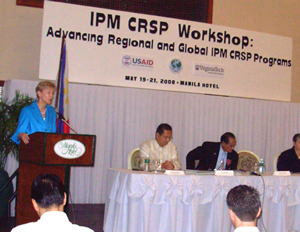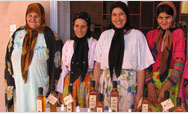Food Security
U.S. Ambassador to the Philippines showcases work on food security through Integrated Pest Management workshop
 |
| U.S. Ambassador to the Philippines, Kristie A. Kenney, opens Workshop on Integrated Pest Management to showcase work on food security. |
Ninety scientists, specialists in agronomy, horticulture, insects, plant diseases, weeds, economics, information technology, and the social sciences, convened on Monday, May 19, 2008 in Manila, Philippines to share success stories and report research results related to Integrated pest management (IPM). U.S. Ambassador to the Philippines Kristie A. Kenney opened the workshop at the Manila Hotel. She urged participants to be pro-active in transferring developed technologies to small farmers who could use them to increase yields and reduce production costs.
IPM developed as a science during the last four decades of the 20th century in response to the unexpected consequences associated with the overuse of synthetic pesticides. It is viewed by some scientists as a major weapon against food insecurity. According to Dr. Muni Muniappan, entomologist and Director of the IPM Collaborative Research Support Project (CRSP), “With the IPM techniques, we are getting farmers to increase their crop yields by as much as 83% in some cases, and here in the Philippines, in areas where IPM is practiced, calorie consumption has gone up by 90 calories per person per day.”
The Integrated Pest Management CRSP, is a global project funded by USAID and managed by Virginia Tech that uses a holistic approach to reducing damage caused by pests without harming the environment. It is designed to introduce and maintain IPM best practices in countries around the world. The program has been operating in the Philippines since its inception in 1993.
IPM CRSP scientists in the Philippines have helped farmers to increase their production of tomatoes, onions, beans, eggplant, and cabbage by as much as 45%. By also substantially reducing pesticide use, farmers are reducing their expenses and achieving a higher income. In the Philippines, the project collaborates with PhilRice, the University of the Philippines at Los Baños, and the International Rice Research Institute.
The IPM CRSP project is a large venture working in 32 developing countries on four continents, and with more than 60 host country institutions and international organizations. Twenty U.S. universities collaborate in the project’s implementation.
Back to Top ^ |




